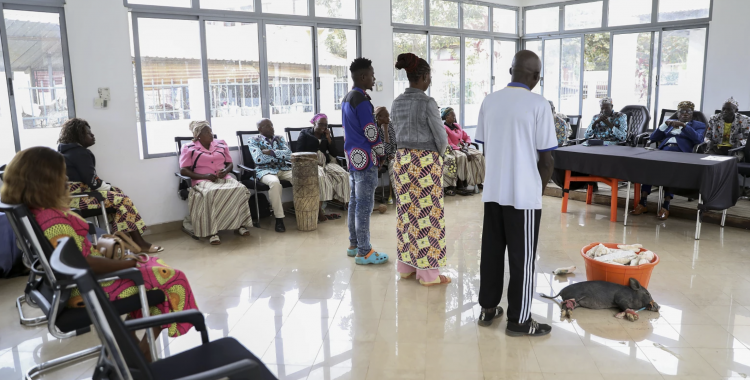Formally, it is a court like any other: it has defendants, witnesses, judges, clerks, complaints and sentences that are recorded in minutes and are mandatory.
But the cases are substantially different from those that occur in Portugal.
Among the most frequent cases are accusations of witchcraft, often motivated by conflicts between clans caused by everyday matters such as a relationship disapproved of by the family.
In the trial that Lusa attended, the thwarted passion between a "Romeo" and a "Juliet" from Mbanza Congo was at the center of an accusation of witchcraft.
The mother of "Juliet", upset with her daughter's choice of love, initially tried to dissuade her, without success, and ended up threatening "Romeo" that "he would see what would happen".
Just like the Shakespearean tragedy, set in 16th century Italy, this one that took place in Angola today also had a tragic ending.
This year, "Romeo" fell ill and died, and the family accused "Julieta's" mother of having "eaten" (killed) him.
The mother, Graça Adelini, – who managed to prove her innocence after the fortune tellers she consulted declared that her heart "was clean" – returned to court to receive compensation, but she is crying over the suffering caused by the false accusation, which caused her to lose her friends in the neighborhood and see her own children insulted as "the witch's children."
The sentence is given by Afonso Mendes, the highest figure of traditional authority and representative of the King of Congo, and the 24 members of the royal court who form the Lumbu, a customary court that judges community issues.
The session, which takes place in Kikongo (the language spoken by the Bakongo people of northern Angola), begins at around 9:30 am and some locals take the floor to present their issues.
A man complains that he is being accused of witchcraft and presents a letter that will start his case.
Another man questions the court about the progress of his case, opened three years ago and which has to do with a land dispute, still waiting for a definitive solution.
Another man, from Noqui, 150 kilometres away, asks the authorities to intervene because he is afraid of death, after having been expelled and threatened with death by neighbours who want to keep his land and destroyed his house.
These are problems that involve clans and that Afonso Mendes forwards to the Angolan authorities.
"That is a crime, you will have to file a complaint with the police", he responds to the apprehensive complainant from Noqui.
"They told him: you are not from here, your ancestors were slaves, you have to leave. He says they are coming with machetes to kill him", translates Angelina, one of the members of the court.
The clans usually determine the ownership of the land and each clan must respect the limits imposed to prevent conflicts, explains Afonso Mendes.
In cases of witchcraft, experts are consulted who help to deliberate on the innocence or guilt of the accused person who, if acquitted, may receive compensation, while the accusers "will receive advice to stop these practices".
The trial takes place with the councils giving wise words and recommendations in the form of parables, songs and dances that also serve as teachings.
There are also rules to follow: women must not enter wearing trousers, men must not enter wearing shorts, it is forbidden to cross their legs, people must not speak loudly and permission must be asked first. Failure to comply is subject to a fine and the elders emphasize the importance of respect.
In the lumbu, everyone has their role. There are judges, counselors, inspectors, people involved in protocol, a secretary, a spokesperson, facilitators, and a clerk, on whose desk are two full files, attesting that there are no limits to the cases that go to court on Wednesdays and Fridays.
The time has come for the sentence and Graça Adelini, the accused of witchcraft, will have to say whether she accepts the compensation that is put in front of her: a small piglet, a bowl of cassava, two crates of beer and 5000 kwanzas.
After leaving to talk to her family, Graça rejects the compensation, because she considers that the piglet, which is too small, does not compensate for the humiliation and shame she feels in the neighborhood.
A negotiation process follows in which both parties go out to discuss the compensation that Graça continues to refuse to accept, while the accused's family members protest more heatedly and threaten to "beat up" anyone who continues to call her a witch.
The judges end up ruling that the compensation should be increased and delivered next week, concluding the session without fully pleasing either party.
Graça Deliani tells Lusa that she is not happy because the things that were brought to her "are not complete" and gets emotional when talking about the fight that led her to leave the neighborhood.
"The boy died and they accused me, that I 'ate' the boy (...), wherever I go, they always point the finger, that this girl here is a witch, a sorceress, they are isolating me, I can't talk to anyone", she cries.
The young man's mother, Fineza dos Santos, recalls that Graça told her son "I'll show you" before he fell ill, but, as she prays, "she doesn't like those witchcraft things" and says that it is out of date.
Now she wants to resolve the situation, but she laments: "How much more will I have to spend?"







